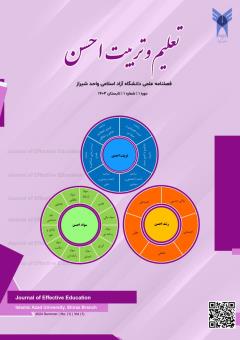اعتباریابی الگوی طراحی برنامه درسی سواد تغذیه¬ای دانش¬آموزان دوره ابتدایی
محورهای موضوعی : تعلیم و تربیتاکرم السادات میرخاندوزی 1 * , مریم صفری 2 , حسن صائمی 3 , علی اصغر بیانی 4 , حسنیه گودرزی 5
1 - گروه علوم تربیتی، واحد آزادشهر، دانشگاه آزاد اسلامی، آزادشهر، ایران
2 - گروه علوم تربیتی، واحد آزادشهر، دانشگاه آزاد اسلامی، آزادشهر، ایران
3 - گروه علوم تربیتی، واحد آزادشهر، دانشگاه آزاد اسلامی، آزادشهر، ایران
4 - گروه علوم تربیتی، واحد آزادشهر، دانشگاه آزاد اسلامی، آزادشهر، ایران
5 - گروه روانشناسی، واحد آزادشهر، دانشگاه آزاد اسلامی، آزادشهر، ایران
کلید واژه: واژگان کلیدی: اعتباریابی, برنامه درسی سواد تغذیهای, دانشآموزان, دوره ابتدایی,
چکیده مقاله :
چکیده
این پژوهش با هدف اعتباریابی الگوی طراحی شده برای برنامه درسی سواد تغذیه ای دانشآموزان دوره ابتدایی انجام شد. این پژوهش به لحاظ هدف، کاربردی و به لحاظ روش، کیفی از نوع نظریه دادهبنیاد است. جامعه آماری شامل مدیران مدارس ابتدایی ناحیه 1 و 2 شهر کرمان، اساتید دانشگاه، صاحبنظران و خبرگان بود که تا رسیدن به اشباع مفهومی تداوم داشت و با روش نمونهگیری هدفمند تعداد 12 نفر انتخاب شدند. دادهها با استفاده از مصاحبههای نیمهساختاریافته جمعآوری شدند. برای بررسی روایی و پایایی دادهها، از روشهای بازبینی توسط مشارکتکنندگان و مرور توسط خبرگان غیرشرکتکننده استفاده شد و پس از دریافت نظرات اصلاحی، ویرایش لازم انجام گرفت و شاخصها به وسیله روش دلفی اعتبارسنجی شدند. تحلیل دادهها با استفاده از نرمافزار MAXQDA نسخه 2020 انجام شد. نتایج نشان داد که در مرحله کدگذاری باز، 199 کد استخراج شد که در مرحله کدگذاری محوری به 60 کد کاهش یافت. در نهایت، 7 کد گزینشی شامل اهداف برنامه درسی، محتوای آموزشی برنامه درسی، روشهای یاددهی، روشهای ارزیابی، ابزارهای آموزشی، موانع اجرای برنامه درسی و ارگانهای حمایتی به دست آمد.این نتایج نشاندهنده اهمیت و نیاز به برنامههای درسی جامع و هدفمند در حوزه تغذیه برای دانشآموزان دوره ابتدایی است که میتواند نقش مهمی در ارتقای سلامت عمومی و آگاهی تغذیهای دانشآموزان ایفا کند.پیشنهاد میشود که با توجه به یافتههای این پژوهش، برنامههای آموزشی برای معلمان و والدین طراحی و اجرا شود تا آنها نیز با اصول تغذیهای آشنا شوند و بتوانند از تلاشهای مدارس در این زمینه حمایت کنند. همچنین، استفاده از فناوریهای نوین مانند اپلیکیشنهای آموزشی و پلتفرمهای یادگیری آنلاین میتواند به بهبود فرآیندیاددهی و یادگیری کمک کند.
Abstract
This study was conducted with the aim of validating the designed model for the Nutrition Literacy Curriculum for Elementary School Students. This research is applied in terms of purpose and qualitative in terms of method, and is of the data-based theory type. The statistical population included the principals of elementary schools in Districts 1 and 2 of Kerman city, university professors, experts, and scholars, which continued until conceptual saturation was reached, and 12 people were selected using purposive sampling. Data were collected using semi-structured interviews. To examine the validity and reliability of the data, methods of review by participants and review by non-participating experts were used, and after receiving corrective comments, the necessary editing was done, and the indicators were validated using the Delphi method. Data analysis was performed using MAXQDA software version 2020. The results showed that in the open coding stage, 199 codes were extracted, which were reduced to 60 codes in the axial coding stage. Finally, 7 selective codes were obtained, including curriculum objectives, curriculum educational content, teaching methods, assessment methods, educational tools, barriers to curriculum implementation, and support organizations. These results indicate the importance and need for comprehensive and targeted curricula in the field of nutrition for elementary school students, which can play an important role in promoting general health and nutritional awareness of students. It is suggested that, according to the findings of this study, educational programs be designed and implemented for teachers and parents so that they can also become familiar with nutritional principles and be able to support schools' efforts in this field. Also, the use of modern technologies such as educational applications and online learning platforms can help improve the teaching and learning process.
Keywords: Accreditation, Nutrition Literacy Curriculum, Students, Elementary School

